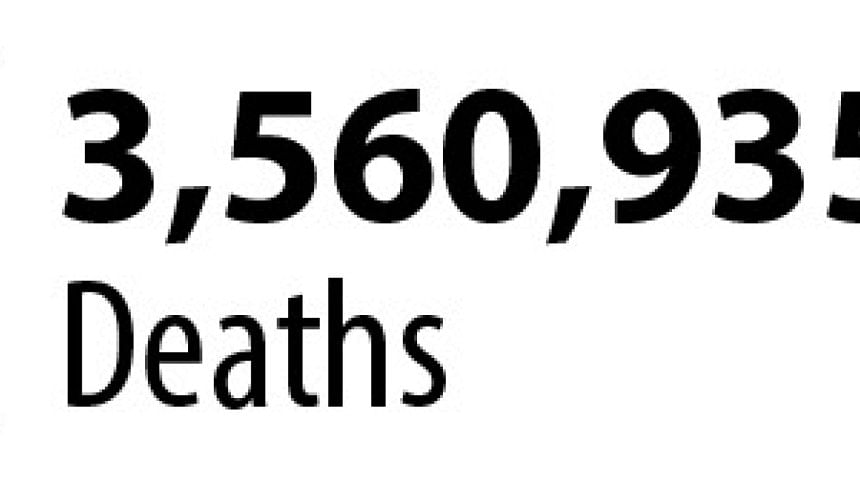UK in early stages of 3rd Covid wave
Scientists said there are signs the UK is in the early stages of a third wave of coronavirus infections, casting doubt on plans in England to lift all lockdown restrictions in three weeks' time.
Experts warned that any rise in hospital admissions could leave the health authority struggling to cope as it battles to clear the huge backlog in non-Covid cases.
Prof Ravi Gupta, from the University of Cambridge, said although new cases were "relatively low" the Indian variant had caused "exponential growth".
He said ending Covid restrictions in England on 21 June should be postponed.
Environment Secretary George Eustice said the government could not rule out a delay to the planned lockdown easing.
The vaccines minister, Nadhim Zahawi, refused to deny that some restrictions such as mask wearing and working from home might remain in place to reduce the spread of the virus.
Senior scientific advisers believe that, where possible, working from home makes sense beyond June because it would cut the number of people who come into contact with each other.
On Sunday, the UK reported more than 3,000 new Covid infections for a fifth successive day. Prior to this, the UK had not surpassed that number since 12 April.
Asked on BBC Radio 4's Today programme whether the UK was already in a third wave of infections, Prof Gupta said: "Yes, there has been exponential growth in the number of the new cases and at least three-quarters of them are the new (Indian) variant.
"Of course the numbers of cases are relatively low at the moment - all waves start with low numbers of cases that grumble in the background and then become explosive, so the key here is that what we are seeing here is the signs of an early wave."
However, he said the number of people who have been vaccinated in the UK meant this wave would probably take longer to emerge than previous ones.
"There may be a false sense of security for some time, and that's our concern."
In China, authorities imposed fresh travel limits, cancelled flights and tested thousands of residents in Guangdong yesterday after the Indian variant of the coronavirus was reported in the country's most populous province.
Vietnam announced the suspension of incoming international flights to its capital and tightened restrictions in its biggest city, as part efforts to contain the coronavirus outbreak that has seen cases double in the past month.
Australia's second-most populous state of Victoria, the epicentre of the country's latest coronavirus hotspot, reported 11 new cases of community transmission yesterday and authorities warned the situation could worsen in coming days, reports Reuters.
The state officially reported five new cases in the 24 hours to midnight. At a press conference on yesterday, authorities announced a further six cases were recorded after the late night cut-off which will reflect in today's data, taking the current cluster to 51.
Meanwhile, officials said yesterday that India's Serum Institute will increase production of AstraZeneca vaccines by nearly 40% in June, in the first step towards alleviating a shortage that has worsened the country's battle with coronavirus.
Government officials and experts say the only way India can avoid a third wave of infections is by having most of its 1.3 billion population inoculated.
India reported its lowest daily rise in new coronavirus infections since April 11 yesterday at 152,734 cases over the past 24 hours, while deaths rose by 3,128.
INTEL ON COVID ORIGINS
A WHO-affiliated health expert called on the US to share any intelligence it has about origins of the coronavirus outbreak with the world health body and scientific community.
The Wall Street Journal last week cited US intelligence agencies who said they were told that three unnamed members of staff at a lab in the Chinese city of Wuhan were sick enough to go hospital in November 2019 with Covid-like symptoms.
US intelligence chiefs later stressed they did not know how the virus was transmitted initially, but that they had two theories: either it emerged naturally from human contact with infected animals, or it was a laboratory accident.
Speaking to BBC Radio 4's The World This Weekend on Sunday, Dr Dale Fisher said the theory that the virus leaked from a laboratory was "not off the table", but remained "unverified".
Fisher, chair of the Global Outbreak Alert and Response Network, which is coordinated by the WHO, urged the US to share any intelligence it had. "The Wall Street Journal is not really the way to share science," he said.
Referring to the WHO's visit earlier this year, Fisher said: "We believe that all the laboratory workers have had serology [tests] done and all those antibody tests were negative and that was part of the reason why the risk was downplayed."
Dr Tedros Adhanom Ghebreyesus, director general of the WHO, said he did not believe the initial report was extensive enough and called for more research, adding that all hypotheses as to the origins of the virus that causes Covid-19 "remain on the table".
Fisher urged the WHO to set out its plans for further investigation.


 For all latest news, follow The Daily Star's Google News channel.
For all latest news, follow The Daily Star's Google News channel. 



Comments